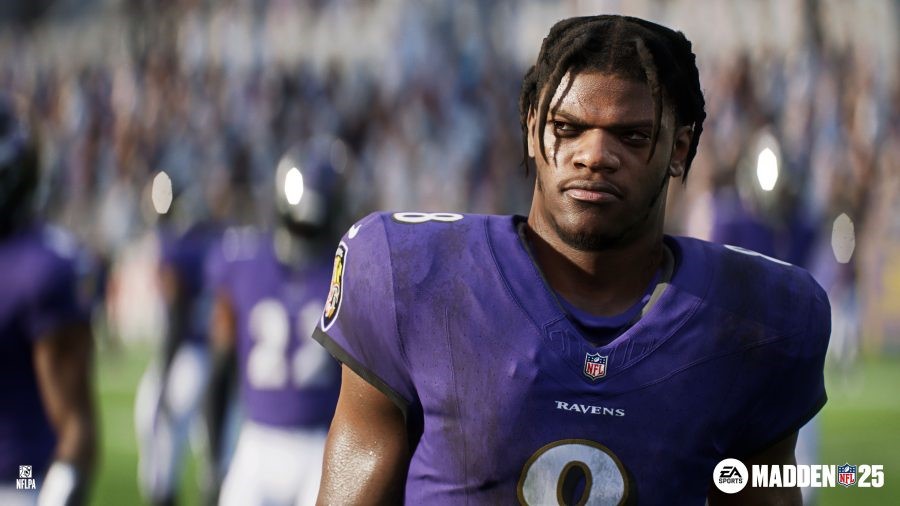Madden 25 developers are diehard fans and players, too
Madden 25 developers are diehard fans and players, too

Some of my observations from Madden NFL 25’s preview event last month in Orlando, Fla., and the new game’s big reveal on Friday:
One of the more refreshing things about meeting video games developers in person is the reminder that these folks love sports, love video games, and play them too. And even though it’s their job to make them, they play them just as obsessively as I do.
In a discussion with Mike Mahar, a senior producer not just for Madden but also its sibling College Football team, I got him to open up ever so slightly about the internal telemetry that the studio monitors not only to help balance the game, but also to highlight the areas where users really are spending the most time, and therefore which need the most attention. This data is closely guarded. I can count on one hand the number of times a sports developer has talked about telemetry with me, in terms of what they can derive from player behavior.
EA Sports Orlando seriously studies player engagement, retention, especially as regards its career modes. One of the more vexing problems for any sports developer, not just EA, is how you keep a player involved for a second season in a career mode, if not just for one full, complete first season.
People have lives, families, and other entertainment options after all. So sinking the hook and keeping someone coming back is always the ideal. “We look at data, in terms of engagement, games, played, session days for the players, where people are playing to, where they drop off,” Mahar said. “We look at that stuff in real time after we ship the game, and we try to understand when players are dropping out, dropping off, based on position [in the Superstar mode] because every position is different.
“And then we start taking a look at, ‘Is it progression? is it getting too hard? Is it good? Is it too easy too quickly?’” Mahar said. “We make adjustments in real time, live.”
To finish, first you must restart
I couldn’t resist, and I asked, “Do you look at how many times people restart?”
“Oh my God, yeah,” Mahar said, knowingly. This is one of the markers of the diehard sports video game fan, compulsively restarting your career in order to Do It Right This Time. I’ve restarted my MLB The Show 24 career about a dozen times, for example.
“We have data internally right now, with the [Draft] Combine,” he said, referencing the suite of mini-games that form the preamble of a Superstar career in Madden NFL 25, “every single person testing the Combine drills plays them three times. Each drill. Three.”
I almost cackled laughing because I was restarting my Draft Combine drills in Madden NFL 24 after disappointing 40-yard dash times, or feeling like I didn’t run the best routes out of the backfield in the pass-catching drills. Madden NFL 25 will have a suite of even more drills for my Superstar running back to restart.
“Have at it,” Mahar said, “I love it. That’s what we want. I get a new build, every day, everyone does, mostly. And I still will play every Combine drill, like a couple of times, to see if I can get my score better.”
That brings us to Isaac Etheridge, a Madden designer who came to the company through the old GameChanger program. That was an effort, more than a decade old, which cultivated high-level players — who would be called influencers in today’s vocabulary — and those whose feedback proved particularly insightful might end up getting jobs with the mothership itself. It’s the kind of rags-to-riches story any video gamer of any genre dreams of, and Etheridge is hardly the only one; Christian McLeod of the EA Sports College Football 25 team also came up the same way.
‘A super-awesome fake name’
Etheridge, who streams under the nickname Spade (and wears a baseball hat with that name on it) was chopping it up with me about Superstar and how the overall gameplay improvements, which he was also a part of, have helped that mode change and develop. I assumed that because he was so fired up about new ball-carrier skill moves that he plays that mode as a running back, same as I always do.
No, actually. “Typically I play as a cornerback,” he said. “Last year I made a cornerback, a middle linebacker, and a running back.” That’s three careers, folks, on personal time, not testing.
I asked Etheridge if he creates himself under his name or if he has a secret identity with a super-awesome fake name. “It’s a super-awesome fake name,” he said. This also is something of a tradition among diehard sports game fans.
“I have a guy whose name is Dee — D-E-E — and his last name is Future. Dee Future. He is gonna take over the league,” Etheridge said grinning.
I can’t wait. I hope Madden Ultimate Team developers give Dee Future a card.
The post Madden 25 developers are diehard fans and players, too appeared first on ReadWrite.
(7)


